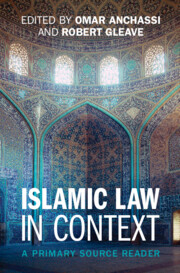Book contents
- Islamic Law in Context
- Islamic Law in Context
- Copyright page
- Contents
- Acknowledgements
- Contributors
- Introduction
- Part I Islamic Legal Theory (Uṣūl al-Fiqh) and Related Genres
- Part II Islamic Jurisprudence (Fiqh) and Related Genres
- Part III Legal Opinions (Fatwās)
- Chapter 17 Introduction to Part III
- Chapter 18 Ottoman Fatwās on the Substitution of Defunct Endowment Properties, from al-Aqwāl al-Marḍiyya of Qāḍīzādah Muḥammad Ṭāhir (d. 1254/1834)
- Chapter 19 Settling Disputes among Nomads
- Chapter 20 Fatwās on Aspects of Modern Life
- Chapter 21 ‘According to the Qaul Muʿtamad it is Unlawful and Invalid’
- Chapter 22 An Online Fatwā from the Dār al-Iftāʾ al-Miṣriyya on Women’s Leadership
- Chapter 23 ‘His Doctrine is Deviant’
- Part IV Court Judgments and Other Court Documentation
- Part V Judicial Manuals and Reference Books
- Part VI Alternative Sources for Islamic Legal Studies
- Name Index
- Subject Index
- References
Chapter 21 - ‘According to the Qaul Muʿtamad it is Unlawful and Invalid’
The 2005 Majelis Ulama Indonesia Fatwā on Interreligious Marriage
from Part III - Legal Opinions (Fatwās)
Published online by Cambridge University Press: 14 November 2024
- Islamic Law in Context
- Islamic Law in Context
- Copyright page
- Contents
- Acknowledgements
- Contributors
- Introduction
- Part I Islamic Legal Theory (Uṣūl al-Fiqh) and Related Genres
- Part II Islamic Jurisprudence (Fiqh) and Related Genres
- Part III Legal Opinions (Fatwās)
- Chapter 17 Introduction to Part III
- Chapter 18 Ottoman Fatwās on the Substitution of Defunct Endowment Properties, from al-Aqwāl al-Marḍiyya of Qāḍīzādah Muḥammad Ṭāhir (d. 1254/1834)
- Chapter 19 Settling Disputes among Nomads
- Chapter 20 Fatwās on Aspects of Modern Life
- Chapter 21 ‘According to the Qaul Muʿtamad it is Unlawful and Invalid’
- Chapter 22 An Online Fatwā from the Dār al-Iftāʾ al-Miṣriyya on Women’s Leadership
- Chapter 23 ‘His Doctrine is Deviant’
- Part IV Court Judgments and Other Court Documentation
- Part V Judicial Manuals and Reference Books
- Part VI Alternative Sources for Islamic Legal Studies
- Name Index
- Subject Index
- References
Summary
This chapter explores a controversial 2005 legal opinion (fatwā) of the MUI—the Indonesian Ulama Council (Majelis Ulama Indonesia) empowered by President Suharto in 1975 to serve as a semi-official religious authority—on the subject of interreligious marriage, and specifically, marriage to so-called ‘People of the Book.’ The MUI finds such marriages to be unlawful, based on the preponderance of harm over benefit therein. This is somewhat surprising given the general permissibility of such unions according to the four Sunnī schools. The logic of the arguments produced in favour of the prohibition are discussed, as well as the political and social contexts of the debate.
Keywords
- Type
- Chapter
- Information
- Islamic Law in ContextA Primary Source Reader, pp. 223 - 233Publisher: Cambridge University PressPrint publication year: 2024

